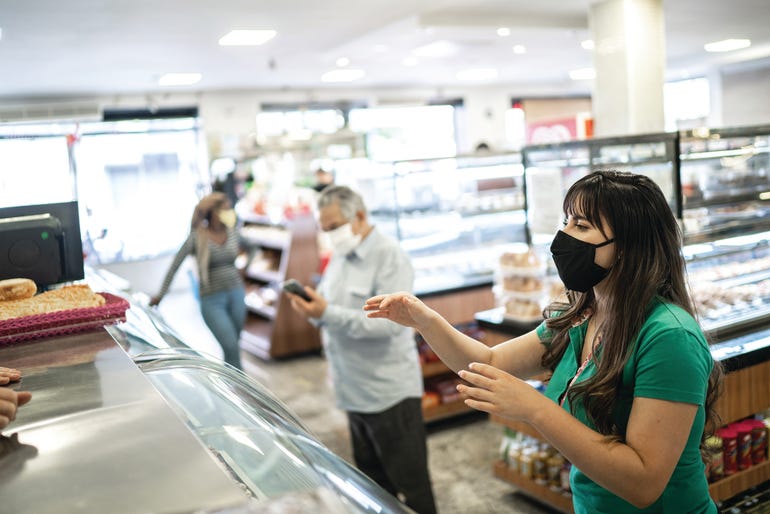Safety first for supermarket foodservice workers
Impact of COVID-19 makes training in sanitation and food safety a higher priority in the deli department.

Supermarkets have always been concerned about food safety, but that commitment has been intensified since the COVID-19 pandemic changed how customers shop and retailers operate their businesses. That’s why most grocers have reinforced strong training for safety measures in their stores.
Wegmans, for example, now has dedicated cleaning teams in its stores, responsible for the increased sanitation of high-contact touchpoints such as the deli counter and food bars. This is something that many supermarkets have followed suit with since the pandemic.
Jake Tavello, store director of Stew Leonard’s Farm Fresh Food, noted the stores heightened their focus on the sanitization of high-touch areas like doorknobs, keypads, shopping carts and animation buttons.
“We have also added a third step to our overnight cleaning program—bleaching our food contact surfaces between the washing and sanitizing steps, which is above the CDC guidelines,” he said. “From the time a product gets from our loading dock to our shelves, we’re focused on safety and quality, and we dedicate a lot of time and resources to reinforcing this.”
Mayer Gold of Queens, New York-based Seasons Kosher Supermarket, has seen some big changes in the store, with an increased cleaning regiment and more food safety guidelines set forth by the CDC, but believes it has added to the great service that the stores provide and is happy it’s the way of the future.
“There’s no question that customers are more concerned about food safety than ever before, and it’s important that we do what we can to ensure them that we are doing all we can in regards to safety protocols,” Gold said. “The deli department has a lot of activity and we make sure that this is an area that gets a lot of attention.”

Safety training has been intensified since COVID-19 changed how customers shop and retailers operate their businesses.
Food industry expert Brian Nagele, CEO of Restaurant Clicks, notes grocers should be training their employees on proper handwashing and new cleaning protocols including sanitizing all customer touch surfaces.
“They should also be teaching them about safety for themselves, correct use and wearing of PPE, hand sanitizing and social distancing from coworkers and customers,” he said. “Food safety was always an important part of working in a supermarket, as you are handling goods people will take home to their families, but with the introduction of the coronavirus, many things needed to change.”
Strong training
Publix Super Markets, for one, requires its managers to achieve a Food Protection Manager Certification, which has been endorsed by the Centers for Disease Control and Prevention, and a critical safeguard in the post-pandemic world. All employees are also required to undergo training to ensure that everything is at a top level of food safety, according to a spokesperson. This requires testing and a solid commitment to Publix’s safety pledge.
At Stew Leonard’s, food safety officers offer quarterly training sessions for its team members, focusing not only on basic things like handwashing and glove changing, but also how to perform temperature checks and protect against cross-contamination.
“We do sanitation inspections, swab testing and product and environmental sampling on a regular basis,” Tavello said. “We also encourage our team members to stay home if they aren’t feeling well to keep both our customers and their fellow team members safe.”
Labor issues
But the reality of today’s labor market means that people don’t last in jobs as long as they once did, and the tighter labor environment has made it hard to keep a well-trained staff in the deli and foodservice departments since the pandemic began. That requires constant training and re-teaching to new people coming in, which can be a drain on resources.
“We have team members throughout each of my family’s seven stores who are cross-trained in deli so that we can always keep the department fully staffed,” Tavello said. “We do our very best to keep people engaged and happy through things like offering good health benefits, training programs, tuition reimbursement and appreciation events like free lunches and company picnics.”
Restaurant Clicks’ Nagele notes that because the deli isn’t often seen as a “glamorous” job, it can lead to quick turnover and wasted hours teaching staff about proper safety techniques.
“The best solution for this is to train your already existing staff more widely so they can work in multiple departments, opening your store to more options for shifts and work experience,” he said. “Cross-store training can be a huge help in a tighter market.”
If stores want to keep their labor force, he suggests offering competitive wages, benefits, sick leave and providing a pleasant place to work—as this will get people in the door and keep them. Retention and training are key to a successful deli operation.
 This piece originally appeared on Supermarket News, a New Hope Network sister website. Visit the site for more grocery trends and insights.
This piece originally appeared on Supermarket News, a New Hope Network sister website. Visit the site for more grocery trends and insights.
About the Author
You May Also Like


